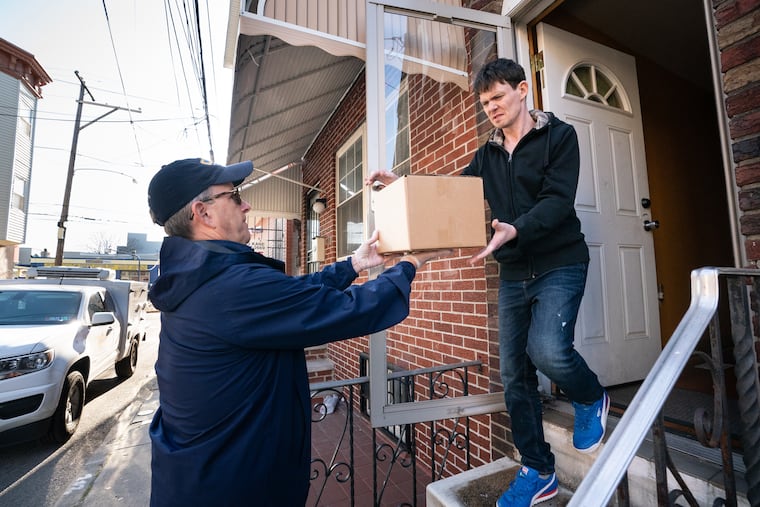MANNA, Meals on Wheels, and other food services for the homebound are losing volunteer drivers afraid of coronavirus
“Our volunteer drivers tend to be older themselves,” and in a higher risk group for coronavirus, said Meals on Wheels’ director of marketing. “They have a warranted anxiety. But we are completely dependent on them for delivery.”

The MANNA food truck squeezed down tight and tiny Watkins Street in South Philadelphia Monday, where rowhouse neighbors share walls and worries about the coronavirus.
Usually, a volunteer for the agency, which provides meals for 1,400 home-bound individuals with life-threatening illnesses in the region, will drive the squat white truck that keeps the frail alive.
But around 70% of MANNA’s yearly force of 9,500 volunteers — many of whom participate through their companies — have stopped showing up lately because of fear of coronavirus. So, Monday’s driver was Rob Saxon, director of external affairs for MANNA, whose motto is, “Food is medicine.”
“I’m doing it today," Saxon said. “All hands on deck,” his boss had told him.
For agencies that deliver food and meals to the home-bound sick and elderly, the coronavirus has necessitated a widely choreographed scramble — substituting drivers, rearranging meals, changing the way food gets into needy hands.
No one has yet cut off supplies. But the process is growing tricky.
‘Scary times’
Members of MANNA’s permanent staff of 42, headquartered at 20th and Callowhill Streets, all are pulling extra duty, according to CEO Sue Daugherty, a registered dietitian.
She said she was not aware of any client who’s been diagnosed with the coronavirus. Daugherty added, “We have no plans on disrupting normal delivery. These are scary times for a lot of us, and terrifying for our clients, 95% of whom fall well below the poverty level and are unable to get to a grocery store.″
Typically, MANNA makes a week’s worth of meals (21) for a client and delivers them frozen in a single day. Monday wasn’t meals day. Rather, the agency was dropping off emergency boxes of shelf-stable food to augment the meals during the crisis.
Michael Olsen, the client who lives on Watkins Street, was grateful for the delivery. He’s hard of hearing, legally blind, HIV-positive, and recovering from a car accident that left him with serious injuries.
“This is the most I’ve stood up in a long time,” Olsen, 38, said as he received his box in the morning cold while neighbors’ St. Patrick’s Day decorations fluttered green and festive in the late-winter wind.
He said he wasn’t worried about contact with Saxon, who was wearing gloves. “With this virus, you must stay still and be chill,” added Olsen, on disability from a help-desk computer support job at the University of Pennsylvania. “But," he allowed, "it is scary, and nobody really knows what it is yet.”
A dearth of driver volunteers is also facing the Montgomery County Senior Adult Activities Center (known as Montco SACC), which runs Meals on Wheels operations out of Nicetown, Ambler, and Glenside.
Meals on Wheels is a food-delivery service to home-bound senior citizens regardless of income. Begun in Philadelphia in 1954, Meals on Wheels is a network of 5,000 senior nutrition programs across the country serving 2.4 million clients annually with the help of two million volunteers. Along with the food, Meals on Wheels drivers also conduct a wellness check on their charges.
“Our volunteer drivers tend to be older themselves,” and thus in a higher risk group for coronavirus, said Melissa Buckminster, the agency’s director of marketing. “They have a warranted anxiety. But we are completely dependent on them for delivery.”
As with MANNA, the Montco SACC folks are turning to staff to drive their food trucks.
‘Tranquillity and safety’
Flora Jacqueline Angelucci, 87, of Lower Providence Township, depends on those drivers.
“If it weren’t for Meals on Wheels, I’d be in a warehouse for old people," said Angelucci, a widow who lives alone in a stone house that she and her husband built with family members in 1961. "This house is my place of tranquillity and safety.”
While the virus is worrisome, she said, “I’ve lived through quarantines before: measles, whooping cough, strep throat, scarlet fever. In the old days, you were isolated for those.”
Keeping people from congregating is very much on people’s minds at the Jewish Federation of Greater Philadelphia, which runs five food pantries in the Northeast, on the Main Line, and in other locations.
Normally, clients are permitted to walk into pantries and choose items. “But last week we eliminated client choice and are doing prepackaged food bags," said Brian Gralnick, director of social responsibility. "This is for client safety, as well as for minimizing interaction with our front-line staff.”
Along with problems of food delivery, coronavirus is creating indirect but not inconsequential difficulties for agencies.
For example, both MANNA and Meals on Wheels are dependent on fundraising, and the coronavirus has stymied them, forcing cancellations of events meant to make money for them.
Pennsylvania Ballet was scheduled to perform at a fundraiser for MANNA on March 28 that’s been called off, “our first cancellation in 28 years,” Daugherty said.
Virus-prompted troubles seem to cascade one after the other, and these can be hard times, Angelucci said. "But I’m not a person who’s easily intimidated. I’ve gone through World War II and the Vietnam War.
“I hope all of us come through this with flying colors.”